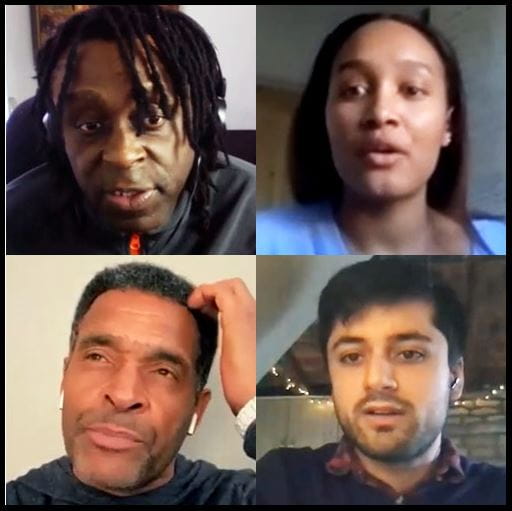Journalism students discover star power in lockdown
-
Date
Tue 17 Nov 20

A BBC radio presenter and a football legend helped Essex journalism students shake off the limitations imposed by lockdown as they investigated the media’s coverage of Black Lives Matter as part of their monthly news day.
The student journalists had to be extra-resourceful when their latest news day coincided with day one of the latest lockdown. They had to find a way to produce a programme on Black Lives Matter under the tightest of deadlines while working remotely in line with COVID-19 guidelines.
Undeterred the team immediately came up with a plan to produce a TV programme without access to their studio, cameras or production facilities. They even bagged a couple of star guests with Essex alumnus and BBC Radio Five Live presenter Dotun Adebayo and former Crystal Palace striker turned pundit Mark Bright agreeing to interviews.
Instead of the usual news magazine programme the students decided on a discussion show focussing on one topic fronted by two third years, Sento Kabba and HK Norman.
Many had noticed how Black Lives Matter had influenced the TV schedules during October. Where usually during Black History Month the main channels carry one or two programmes giving a token nod to raise awareness, this year the students had noted a plethora of shows moved far beyond conventional historical perspectives. From short news features, to landmark series on slavery and shows about identity and hair, they felt October had become a month to really reflect on cultural difference.
Director of Journalism, Tim Fenton explains that Black Lives Matter was a natural choice for the students: “Our journalism students are a diverse bunch – that’s one of their strengths – but this is still a challenging topic. They worked well together and were not afraid to challenge.”
As in so many areas just now, Zoom came to the rescue. The TV studio was swapped for the online platform, which enabled the team to enlist the help of Adebayo and Bright.
They shared stories of the horrendous discrimination they have both faced during their careers, as well as offering a more optimistic vision for the future. Commenting afterwards on the experience for black broadcasters, Adebayo observed that over time advances have been made, but "We who were there, need to constantly remind those who, like Mark said, are the beneficiaries."
In line with standard news day practice, the show was researched and turned around in just a day, with students Cheyanne Bryan and Tom Jervis making the editorial decisions. It also covered a fightback against discrimination by supermarket employees and an interview with a white woman who had organised Black Lives Matter protests in Essex.
Reflecting on the experience Cheyanne said: "Covering Black Lives Matter in the news day was astounding. Topics of sensitivity are usually avoided, to reduce the chance of causing offence, but I felt like everyone was actively engaging with the topic. I was thoroughly impressed with the quality of journalism my peers produced. They covered different aspects with the utmost care and respect, contacting a range of speakers to shine insight onto the different conversations."
The impact of Black Lives Matter on broadcasters is not confined to timely adjustments to the schedules. Prior to 2020, editorial guidelines made clear that ‘The BBC is not impartial on racism’. Even so, this year, following a wave of complaints about the use of the N word in an insufficiently thought through news broadcast, the BBC was forced to review its guidance. While stopping short of an outright ban on strong racist language, it now insists that any programme maker intending to feature it, must refer in advance to their Divisional Director.
Broadcast lecturer Penny Wrout, who was formerly Communities Editor at BBC London, said: ‘There’s still a long way to go, and for lasting change to impact there has to be a shake-up off-screen as well as on, but teaching young journalists how to address these issues directly is all part of the process.”




